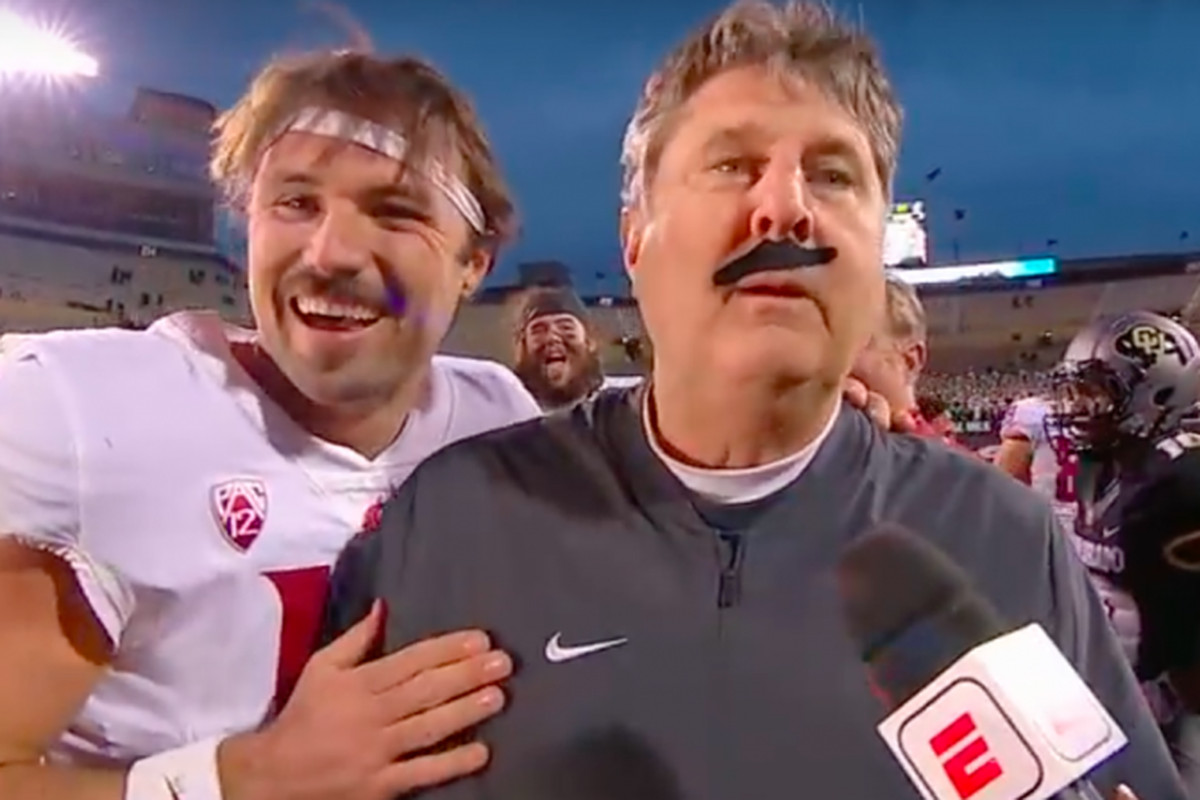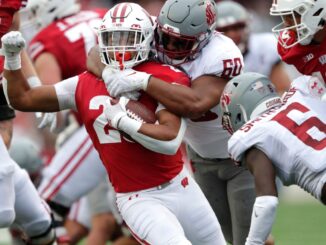
As sports fans, we are well accustomed to the fact that coaches do not stay with the same team forever.
Nonetheless, it can catch us off guard when a coach decides to make a move.
Such is the case with Washington State’s former coach, Mike Leach. Leach is now the head coach at Mississippi State. He’s no longer a fixture on the Palouse.
We can still tune in to his kooky press availabilities, but now he wears a different shade of red. He’s no longer a Cougar. Now he’s a Bulldog.
Sure, there were rumblings in recent years that Leach wanted to make a move—to get out of the shadow of the University of Washington. But that’s almost always true of the majority of coaches.
Now that he’s gone, what should we make of the Leach era at WSU?
Before diving into specifics, let’s state some generalities about Cougar football. Washington State has, with a few exceptions, almost always been at the bottom of the win-loss column in the Pac-12. It was true when there were 10 teams in the conference, and it’s still more or less true today.
Common wisdom goes something like this: WSU is not an ideal location for the best recruits. It’s a regional school. And in this region, whether that be the PNW or the West Coast in general, there are too many other schools where players have a better shot of making the NFL.
There’s probably some truth to all of that.
But Mike Leach did leave his mark.
For starters, Leach had a winning record in four out of his eight seasons here.
That’s better than the eight seasons prior to his arrival in 2012, during which the Cougars did not record a single winning season. You have to give him credit for that.
In two of Leach’s seasons, 2017 and 2018, the Cougars were competing for first place in the Pac-12 North, right up until their final games in the Apple Cup, both of which they lost to the Huskies.
During his tenure, Leach’s quarterbacks were able to unleash thousands and thousands of passing yards, setting some records along the way. Much of that success came with Gardner Minshew under center.
In addition to his entertaining press conferences, such as when he broke down which Pac-12 mascots would win if fighting one another, or his outspoken support of a certain controversial President of the United States, Leach is a system coach. He coaches what’s known as the Air Raid offense. It’s all about a passing attack. Playing defense and running the ball? Not so much.
In summary, Leach will probably be viewed with mixed assessments from the Cougar faithful.
He brought lots of potential and quite a few wins to the program in the Palouse. But he wasn’t able to get them over the hump.
One Apple Cup victory in 2012—in overtime—prior to the Huskies’ dominant era under Chris Petersen.
No division or conference titles.
Hump: not overcome.
So, is Leach better suited to life at his new job in the SEC? Perhaps. Leach did have a winning percentage in all 10 of his seasons at Texas Tech. Tech is not in the SEC, but it is generally in the south.
Leach might have a better recruiting base from which to draw in Mississippi. But he’ll also have plenty of competition. Now he’ll be playing against teams like Alabama, Auburn and LSU every year. It’s hard to imagine that will be easier than facing Oregon, Washington and Cal on a regular basis.
And what to expect of Leach’s replacement in Pullman, Nick Rolovich? That’s the million dollar question.
Rolovich previously coached at Hawaii, which is in the Mountain West Conference. He runs an offense known as the run-and-shoot. It’s big on passing, which should allow thematic and playbook carryover for the players already on the team who are used to Leach’s Air Raid.
But Rolovich also runs the ball a lot more than the Cougars did under Leach. His hiring, in that regard, was almost certainly by design. Try to be less one-dimensional. Make teams honor the run and the pass.
However, the underlying challenges of having success in Pullman still apply. Rolovich is a lesser-known coach than Leach was when he arrived. That’s not necessarily a bad thing. If he can start to notch wins in his first couple of seasons, he may draw more recruits than he otherwise would have.
Also of note, Rolovich seems to be a high-character coach. A good leader and molder of young men. Don’t expect any headline-grabbing quotes or viral videos.
All too often, we assess a coach’s success based upon on-the-field results. But the off-the-field ones are—or should be—seen with equal importance.
Not that Leach had major scandals at WSU. There was the tragic death of Tyler Hilinski in 2018. But that wasn’t Leach’s fault.
Cougar fans should go into this new era with an open mind. At this point, anything is possible. Yes, history suggests that success on the Palouse will be hard to come by. But if history were the sole arbiter of our futures, where would any of us be?
And while fans are absorbing Rolovich’s era at Washington State, they can also follow from afar how Leach does at Mississippi State.
Leach could falter, which could provide comfort to those who were ready for him to move on. Or, he could achieve much greater success at MSU than he did at WSU, which might only cause those who wanted him to stay to lament his loss even more.
Whatever happens at either school, there will be lots of storylines to follow. Feelings and emotions to experience. Statistics to record and ponder.
And that, ultimately, is what keeps us interested in this crazy sport known as college football.




